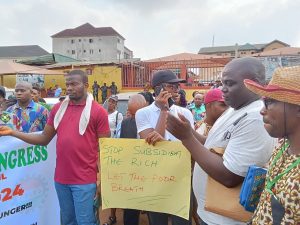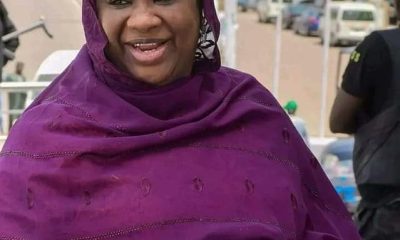Headlines
Emefiele’s strange policies that brought him down
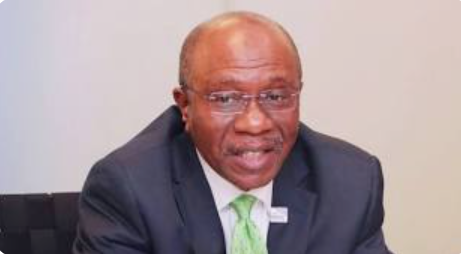
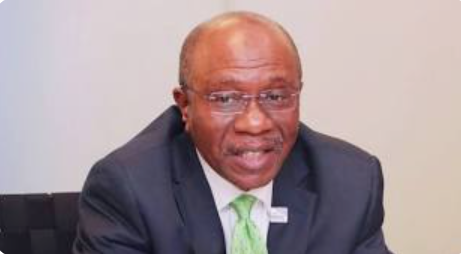
DANIEL ADAJI explores how some knotty policies of the embattled former governor of the Central Bank of Nigeria ultimately forced him into his current travails
Life they say is full of surprises and fate twists as long as a person lives. The story of the embattled former Governor of the Central Bank of Nigeria, Godwin Emefiele, is not farfetched from the foregoing.
Having risen to prominence through an almost miraculous means, he became a mighty force to contend with in Nigeria’s financial landscape. Feared and revered at the same time, Emefiele’s economic policies were ones to be wary of in Africa’s largest economy.
Today, the all-powerful financial emperor lies at the mercy of the Federal Government and the many toes he had stepped on as the former CBN governor, especially the incumbent President of the Federal Republic of Nigeria, Bola Tinubu.
Appointed in 2014 by the then President, Goodluck Jonathan after the controversial ouster of Sanusi Lamido as head of Nigeria’s apex bank, Godwin Emefiele was anointed the right captain to stir the ship of the CBN.
The anointed Emefiele had barely spent one year in his leadership of the CBN when his principal, Jonathan lost his re-election into office as Nigeria’s president. The oil of his anointing must have been so sacred that he was retained as the Governor of Nigeria’s apex bank by former President Muhammadu Buhari, who took over from Jonathan.
He became the longest-serving governor of the CBN after his tenure was renewed by former President. While at the helm of the CBN affairs, Emefiele operated several policies that almost crumbled the country’s economy. In 2015, as Nigeria’s foreign exchange reserves fell by about $5,183,866,731, a situation that closed the year at a 10-year low, Emefiele’s CBN placed foreign exchange restrictions on 43 items like margarine, rice, cement, and private jets.
The CBN claimed that the essence of the restriction was to improve and support local production of these commodities, but it also deprived importers of those commodities access to foreign exchange.
Not long after this self-celebrated feat, the CBN’s policy witnessed stiff economic resistance as black market vendors began to multiply exchange rates, a situation that has been blamed for the weakening of Africa’s largest economy’s currency; the demand for dollars increased at the black market and the naira weakened.
To address the fall of the naira, Emefiele went further to take some unconventional steps. One of them was the reported use of the Department of State Services operatives to monitor the Bureau de Change operators who sold more than the CBN’s pegged N400/$ or bought at more than N390/$. He was also reported to have ordered the cutting of trees where black market vendors worked in the Federal Capital.
In 2021, it was reported that the “CBN under Emefiele issued a circular restricting banks and other financial houses from operating accounts for cryptocurrency service providers, given the money laundering and terrorism financing risks posed by cryptocurrency. The apex bank went further to ban a website that reported the value of the dollar in the black market among other stringent measures.
Poverty, rising inflation
Under his reign as CBN Governor, Nigeria’s inflation kept rising yearly (8.05 percent in 2014 through 9.01 in 2015, and eventually 18.85 percent in 2022 and an all-time high of 27.33 percent in October 2023, according to the National Bureau of Statistics report) and with the naira losing its value.
The NBS data showed that Nigeria became poorer under its financial rule. The NBS reported that some 133 million (about 63%) Nigerians were multidimensionally poor. This meant that the poverty was not just in monetary terms but less access to other basic amenities.
Although factors like the COVID-19 pandemic, and the Russia-Ukraine war cannot be exonerated from being culprits in Nigeria’s economic misfortune, Dr Moses Ogah, a former banker and economist at Joseph Sarwuan Tarka University Markurdi, told NewsNow that the direction of the monetary policies from the central bank also led inflation to rise from a single digit the governor met it in 2014 to double digits currently experienced in the country.
“As Professor Kingsley Moghalu said, ‘He is, without debate the worst and most damaging Central Bank Governor in Nigeria’s history.’ Under his watch, Nigeria’s inflation rose to hyperinflation; from a single digit of eight per cent to an all-time high of about 28 per cent. That is why we are where we are today in the country. The policies are killing us economically. Food inflation which concerns the average Nigerian has risen to about 31 per cent making it more difficult for the indigent to survive,” Ogah noted.
CBN’s law violated
The CBN’s loans to the government otherwise known as ‘Ways and Means’ jumped from N790bn in May 2015 to N23.8tn in 2022 ($49bn). The Ways and Means Advance clause of the CBN Act Section 38(2) & (3) can be activated if the government suffers a revenue shortfall but should not be more than five per cent of the government’s previous year’s budget. The failure to adhere to this rule attracted heavy criticism from different quarters.
A careful observation of the loan given to the government under the Emefiele administration showed a disparity from the amount permissible. This has been blamed for Nigeria’s increasing inflation. Emefiele was reported to have justified the continuous borrowing, saying, “The CBN is a banker to the government and also a lender of last resort to the government, hence it is responsible for helping the government in times of need.
Ogah said the CBN’s loan to the government under the Way and Means by the suspended governor was political and a breach of its (CBN) constitution. “The CBN is supposed to be a regulator of financial institutions in the country while also ensuring economic stability through the formulation of macro-economic and fiscal policies. He went too far to violate the CBN Act in order to please his paymasters,” Ogah added.
The Senate approved the upward review of the Ways and Means loan accessible by the government from five to 15 per cent at the end of President Buhari’s administration. Also, the Senate approved the request of former President Buhari to restructure the N22.7tn loan from the CBN under the Ways and Means provision.
Partisan despite the law
Beyond his monetary policies, that sank Nigeria’s economy for almost seven years, Emefiele became famous for his political involvement, especially in the run-up to the 2023 general elections. The now humbled Emefiele violated Nigeria’s Constitution which states that “a Central Bank governor, to protect the independence of the Central Bank, cannot participate in partisan politics, when he attempts to vie for the presidency in May 2022.
Ahead of the 2023 presidential poll, he approached a court where he sought an order that would permit him to run against Bola Tinubu, Vice-President Yemi Osinbajo, and several other notable politicians for the presidency without resigning.
“He thought he had done enough for the cabal around Buhari and wanted to be rewarded with the president’s seat. He got the support of the cabals to contest in the primary elections and that made him more interested in politics. When it was obvious that he would not win the race against Bola Tinubu, he decided to support another candidate who also lost the election,” Isah Omata an APC party faithful and political analyst told NewsNow.
CBN policy summersault
In October 2022, the CBN rolled out new monetary policies, including a naira redesign, limits on cash withdrawals, and the introduction of a cashless economy. The apex bank argued that the policy aimed to deal with the circulation of fake naira notes and discourage vote-buying, terrorism financing, and cash hoarding among others, a move expert says has debased Nigeria’s economy.
The naira redesign was resisted by the former Minister of Finance, Budget and National Planning, Zainab Ahmed, who claimed that her ministry was not aware of the monetary policy.
Speaking further, Ogah said, “The naira redesign though good at the surface was poorly implemented. Nigerians were not carried along; no proper machinery was put in place to help the citizens cushion the effect of the attendant scarcity that would result from the redesign. This action caused Nigerians a lot of economic misfortune which they are yet to recover from, and the economy is seriously impacted.
The loss of lives in some states over the naira scarcity protest, while banks and PoS operators were reportedly manhandled by frustrated citizens.
Ojochide Adams, a Nigerian said, “At first, I was happy with the CBN policy of naira redesign because I felt it would stop politicians from vote-buying and election rigging. But I became upset when I realised that the new currency was not well circulated and the hunger and suffering in the country became untold. This is one of the worst government financial policies I have seen in Nigeria,” she said.
The death of a 71-year-old broadcast journalist in Oyo State popularly known as Baba Binti due to naira scarcity. He was reported to have died while trekking to work due to a lack of new naira notes to board vehicles.
Currency redesign
The currency redesign was heavily criticised as political and an effort to combat the now President Bola Ahmed Tinubu and frustrate his bid to become the next president of Nigeria. While the move was celebrated by the unsuspecting citizens at first, it came under serious criticism when life became unbearable for Nigerians.
“Worried that he had annoyed Tinubu and would fall out of favour with him should Tinubu win the presidential race, Emefiele decided to introduce harsh economic policies, especially the naira redesign and cashless economy. By this, he intended that the electorate would see APC in a bad light and vote the party out in the general elections,” Isah added.
Tinubu had also accused Emefiele of trying to frustrate his effort to win the elections through the naira redesign policy that mopped up cash from circulation.
“Keep the naira, we will vote and be elected. You may change the ink of naira notes. What you expect will not happen. We will win. They don’t want the forthcoming election to hold. They want to scatter it but that won’t be possible,” Tinubu had said.
Violation of court order
The CBN under Emefiele disobeyed the Supreme Court order that the old naira notes should remain legal tender. Nigerians waited for the CBN and the former President Buhari’s position, but this was not forthcoming, hence the citizens became reluctant to accept the old notes as a means of payment, a situation that further heightened the hardship in the country.
In February, the governors of Kogi, Kaduna, and Zamfara states took the Federal Government to the Supreme Court and urged it to declare the naira redesign illegal. Despite the earlier court order to suspend the policy, the governors went ahead to announce the invalidation of the old naira notes at the expiration of the February 10 deadline.
In March, the Supreme Court gave a final ruling that the old naira notes remained legal tender in the country till December 31, 2023, giving way to all controversies around the matter. It was also reported that “Experts estimated the loss to the failed naira redesign policy at N20tn.”
Multiple exchange rate system
Nigeria’s apex bank under Emefiele’s leadership operated a confusing multiple exchange rate system. This practice left many foreign investors in confusion and uncertainties and created room for corruption and inefficiencies. The multiple exchange rates were however stopped by President Tinubu during his inauguration on May 29, 2023.
Transparency concerns
The suspended CBN governor had come under public criticism for not releasing the financial statement of the apex bank to the public. The action violated the CBN Act 2007 which states that “The bank shall, within two months after the close of each financial year, transmit to the National Assembly and the President a copy of its annual accounts certified by the auditor
“A report required to be submitted to the National Assembly and the President shall be published by the bank in such a manner as the governor may direct.
“The Board shall, as soon as practicable after the last day of each month makeup end, publish a return of its asset and liabilities as at the end of business on that day, or if that day is a holiday, as at the close of business on the preceding business day,” the Act reads.
Failed agricultural reform
Food is a major concern globally, especially in a developing economy where almost 70 per cent of its population is involved in agriculture; one would believe that empowering the farmers would translate to empowering more than half of the country’s population.
In a bid to boost agriculture in the country in line with former President Buhari’s policy for agricultural reforms, the CBN under Emefiele launched the Anchor Borrower’s Scheme; a programme that has been highly criticised for its shady practices.
Agricultural Economists at the University of Africa Bayelsa, Dr Onuche Unekwu, noted that the Anchor Borrowers’ Programme was a good intervention by the President Buhari government, but added that it lacked proper implementation.
“The Anchor Borrowers’ scheme was a very good move by the government. It would have helped to boost agriculture and food security in the country if it had been properly managed. Poor implementation led to poor results,” the varsity don said.
In Ogun State, farmers criticised the programme, saying it did not deliver the value they anticipated.
“We were made to register for the Anchor Borrowers Programme and we mobilised our members massively to register. After a series of orientations and enumeration, we waited for the inputs which did not come until planting seasons were over. Some of our shortlisted members were even replaced on the list,” Oluwole Rotimi, a member of rice farmers’ group lamented.
Fall from grace
In a twist of fate, the oil of his anointing could no longer keep him in favour with the new government. Emefiele fell out of favour with the Tinubu administration when he was suspended on June 9, 2023, and was directed to immediately hand over the affairs of the CBN to the Deputy Governor (Operations Directorate). At this point, the fall from grace began.
What were his sins?
In January, it was reported that the DSS had applied with reference number FHC/Abj/CS/2255/2022 and sought permission from the High Court in Abuja to arrest and detain Emefiele over terrorism financing and fraudulent activities. He was also accused of being involved in economic crimes on the ‘national security dimension’.
The secret police accused Emefiele of fraud, money laundering, round-tripping, and conferment of financial benefits to self and others. He was also accused of corruption related to the “Ways and Means”
After his suspension, Emefiele was arrested by the DSS for investigation on June 10 and freed on June 26 after several legal battles. He would then be arrested the same day by the Economic and Financial Crimes Commission which detained him. He was remanded on November 18 and later released after 34 days in custody on December 23, 2023.
Lessons to learn
In a phone conversation with our correspondent, the Chancellor of the International Society for Social Justice and Human Rights, Jackson Omenazu, advised that political appointees and Nigerians, in general, should understand that power was transient and obedience to unlawful directives had its consequences no matter where it was coming from.
“My only concern is that in Nigeria today, those who approved the directives go home quietly while those who implemented the policies suffer. From all indications, Emefiele is not alone in the financial restructuring of the CBN that crashed the naira. He had the former president’s approval for some of those policies even principal officers of the National Assembly approved these policies. So, they should be called for questioning too,” he said.
Omenazu admonished political appointees to resist wrong directives from their principals.
“I am not holding brief for Emefiele because, at his level, he is supposed to know when there is a wrong directive and tell the president that he cannot implement such policies or append his signature. He kept quiet and played along believing that his master was a superman.
“He should have known that everything has an expiry date and today, he is moving from one prison and court to another while his principal rests at home. Political appointees should rather resign in protest than submit to wrong policies that will negatively impact the citizens,” he said.
The post Emefiele’s strange policies that brought him down appeared first on NewsNow Nigeria.
Education
1ST NIGERIAN TERTIARY INSTITUTIONS CONFERENCE ON UN SUSTAINABLE DEVELOPMENT GOALS (SDGS) ESSAY COMPETITION
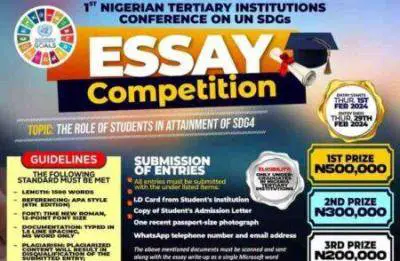
Competition Overview:
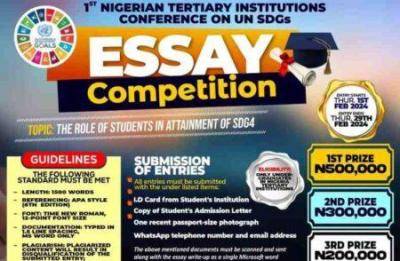
The SDG Youth Essay Competition offers a grand prize of N1 million for the top three winners, along with free sponsorship to attend the 1st Nigeria Tertiary Institution Conference on Sustainable Development Goals (SDGs) in April 2024 in Abuja.
Competition Requirements:
1. Eligibility:
– Open exclusively to undergraduates in Nigerian tertiary institutions.
2. Entry Guidelines:
– Topic:The Role of Students in Attainment of SDG4
– length: Essays should be 1500 words.
– Entry Period: Thursday, February 1, 2024 – Thursday, February 29, 2024
– Referencing: APA Style (6th Edition).
– Font: Times New Roman, 12-point font size.
– Documentation: Typed in 1.5 line spacing, MS Word format only.
– Plagiarism: Only original content is accepted; plagiarized entries will be disqualified.
Benefits:
– Prizes:
– 1st Prize: N500,000
– 2nd Prize: N300,000
– 3rd Prize: N200,000
– Winners will also receive free sponsorship to attend the 1st Nigeria Tertiary Institution Conference on Sustainable Development Goals (SDGs) in April 2024 in Abuja.
Required Documents:
– Student’s Institution ID Card
– Copy of Student’s Admission Letter
– One recent passport-size photograph
– WhatsApp telephone number and email address
Application Procedure:
– All entries and submissions (essay and required documents) should be scanned and sent to nigeriaessay@sdgyouth.org before the deadline.
For Further Inquiries:
– Call: 08068931151, 08133846739, 07067772964
– Email: nigeriaessay@sdgyouth.org
Deadline: February 29th, 2024
Don’t miss this opportunity to contribute to achieving SDG4 and win exciting prizes. Submit your entry and required documents before the deadline. For any inquiries, feel free to contact them via phone or email.
Education
PENTAGON PARTNERS NATIONAL ESSAY COMPETITION FOR UNDERGRADUATE LAW STUDENTS

Competition Overview:

The National Essay Competition invites undergraduate law students to showcase their expertise and contribute to the discourse on AI, privacy, and data protection. In addition to cash prizes, participants have the chance to intern with Pentagon Partners, gaining valuable hands-on experience.
Competition Requirements:
1. Eligibility:
– The competition is open to 400-level and 500-level undergraduate law students in Nigerian universities.
2. Essay Requirements:
– Length: Essays should not exceed 1500 words.
– Format: Double spaced, 12pt Times New Roman font.
– References: OSCOLA format for citations with 10pt font size for footnotes and endnotes.
– Submission Format: Essays must be submitted in PDF format.
– Entrant Details: Include full names, school, level, phone number, and email address in both the body of the email and on the last page of the essay.
– Single Entry: Each entrant is allowed only one submission.
– Originality: Plagiarism will result in automatic disqualification.
Competition Benefits and Timeline:
1. Prizes:
– Winner: N200,000
– 1st Runner Up: N150,000
– 2nd Runner Up: N100,000
2. Internship Opportunity:
– In addition to cash prizes, winners have the exclusive opportunity to intern with Pentagon Partners, enhancing their career prospects.
Application Procedure:
– Interested participants should submit their essays to essay@pentagonpartnerslp.com during the submission period.
– The subject of the email should be the Essay topic
For additional information and updates, visit www.pentagonpartnerslp.com.
Deadline: March 22nd, 2024
Don’t miss this chance to showcase your legal expertise, contribute to important discussions on AI and law, and vie for enticing cash prizes. Pentagon Partners looks forward to receiving your submissions.
Education
SYSTEMSPECS CHILDREN’S DAY ESSAY COMPETITION (CDEC), 2024

Purpose:
Inaugurated in 2020, the CDEC is part of SystemSpecs’ Corporate Social Responsibility (CSR) commitment to promoting capacity development in the Nigerian ICT industry. By encouraging young Nigerians to tackle everyday issues, the competition contributes to intellectual growth and societal progress.

Topic:
The theme for the 2024 competition is “Protecting the Nigerian Child from the Dangers of Online Technology.” Participants are tasked with exploring strategies to safeguard children in an increasingly digital world.
Eligibility:
– Open to primary and secondary school students in Nigeria aged 9 to 16.
– Junior category (ages 9 to 12) essays must not exceed 1,000 words.
– Senior category (ages 13 to 16) essays must not exceed 1,500 words.
Prizes:
– Winners will receive generous rewards, including a high-capacity laptop, premium headphones, a portable laptop stand, a smart wristwatch, and one year of internet data, among other items.
– Consolation prizes will be awarded to other participants.
Application Process:
– Interested candidates should access the application page
– Essays must be written in English and reflect original thought.
– Each participant is limited to one entry.
– Entries must be endorsed by an accredited school official, parent, or legal guardian.
– Deadline for submissions is April 12, 2024.
Submission Guidelines:
– All submissions must be in PDF format and include the student’s name, home and school addresses, email address, and contact phone number.
– Double entries will result in automatic disqualification.
– Submissions must be received by March 15, 2024, at 5:00 p.m.
Notification of Winners:
– Successful students and schools will be contacted in the second quarter of the year.
– Updates on winners will be announced on @nercng social media platforms.
The SystemSpecs Children’s Day Essay Competition offers a unique opportunity for Nigerian students to demonstrate their creativity and problem-solving skills. By addressing the theme of online child protection, participants contribute to building a safer and more secure digital environment for all. We encourage eligible students to seize this opportunity and showcase their talent and ingenuity.
-

 News11 months ago
News11 months agoFull Text of President Bola Tinubu’s Inauguration Speech on May 29, 2023
-
Headlines8 months ago
FULL TEXT: Tinubu Addresses 78th UN General Assembly
-
Headlines9 months ago
Full Text Of President Bola Tinubu’s Address To Nigerians On Socio-economic Challenges
-

 entertainment2 months ago
entertainment2 months agoAuthorities Arrest Six in Connection with Murder of South African Rapper AKA [VIDEO]
-
Headlines11 months ago
Nigerians Berate Tinubu’s Subsidy Removal, Says Dangote Won’t Subsidise Petrol For Nigeria
-

 CELEBRITY NEWS11 months ago
CELEBRITY NEWS11 months agoHilda Baci: 6 Benefits the Nigerian Chef May Enjoy as Guinness World Record Holder
-
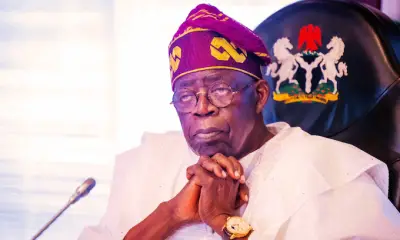
 Headlines2 months ago
Headlines2 months agoTinubu Takes Full Responsibility for Current Economic Hardship
-
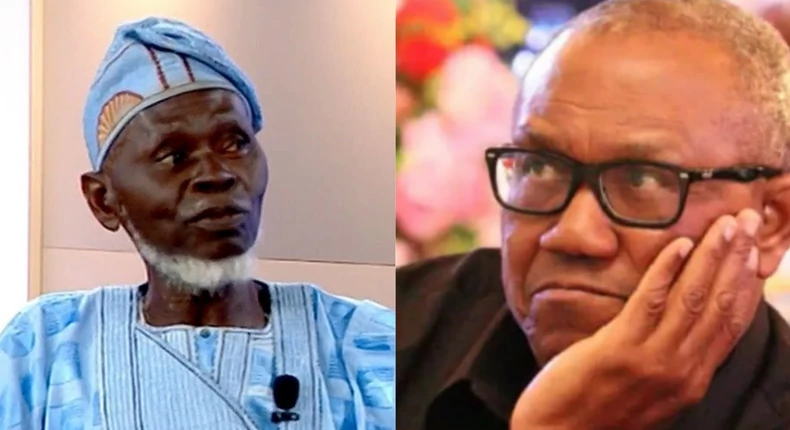
 Headlines12 months ago
Headlines12 months agoApapa labels Peter Obi a liar after court scuffle with LP supporters



